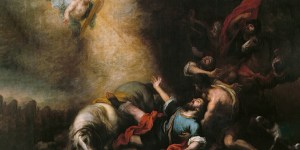The Gospel this Sunday is Lk 15: 1-3. 11-32
The scandal of mercy
Today's parable is the most moving passage in the Gospel. It reveals what the scandal of mercy is all about: "Why is God merciful to someone who does not deserve it?" (as Archbishop G. Ryś put it). In this parable we see that God always welcomes us and forgives all our faults, but He waits for us to make a move. He wants to grant us forgiveness, His life, and all that belongs to Him, if only we are willing to return to Him, that is, if we are converted.
Key Words
The eyes of the Father
There is an expression in Polish that means "to look out one's eyes," that is, to wait for someone so much, to look for him so strenuously, that the eyes are already weak and tired. Such are the eyes of the Father in the parable; he longingly awaits his son and his return home. They are the eyes of someone who loves.
The Father's hands
The Father's hands are ready to embrace his son with love and tenderness. They are also ready to support him. In Rembrandt's famous painting "The Return of the Prodigal Son," we see that each of the father's hands is different. One is like a woman's hand, tender and caring; the other is a strong man's hand that supports and sustains. Such is the love of God: it is both maternal and paternal.
The robe, the ring, and the sandals
The father gives his son a special robe (in Greek “stole”). Such a garment signified reverence for a special guest. It also symbolizes the robe worn by the saved. He also gives him a ring, a sign of authority, a right to his inheritance. The sandals, on the other hand, emphasize the son's free state and his dignity.
All this is given to the son who has sinned against the Father. He returns in rags, with his shoes torn off, and with an empty purse, as we see in Rembrandt's painting. The son has a shaven head with wounds, which may indicate that he was in prison.
Coming to his senses [the son] thought, (…) ‘I shall get up and go to my father’
The father waits, longs for his son's return, but respects his freedom. The turning point in the story is only when the son reflected and decided to return home to his father. He turned back from the path of sin. He found out that this road leads nowhere, although it seemed wonderful to him when he left home. The turning point was his decision to convert.
Today
The father in the parable is God. His prodigal sons -- children -- are us. God is always merciful. "No one is lost, because God does not hand out candy to good children, but raises up those who have touched the bottom," (Bishop G. Ryś).
Do I want God to lift me up? Do I want to come back to him? Do I want to leave my bad ways? He is waiting. Now everything depends on my decision.



